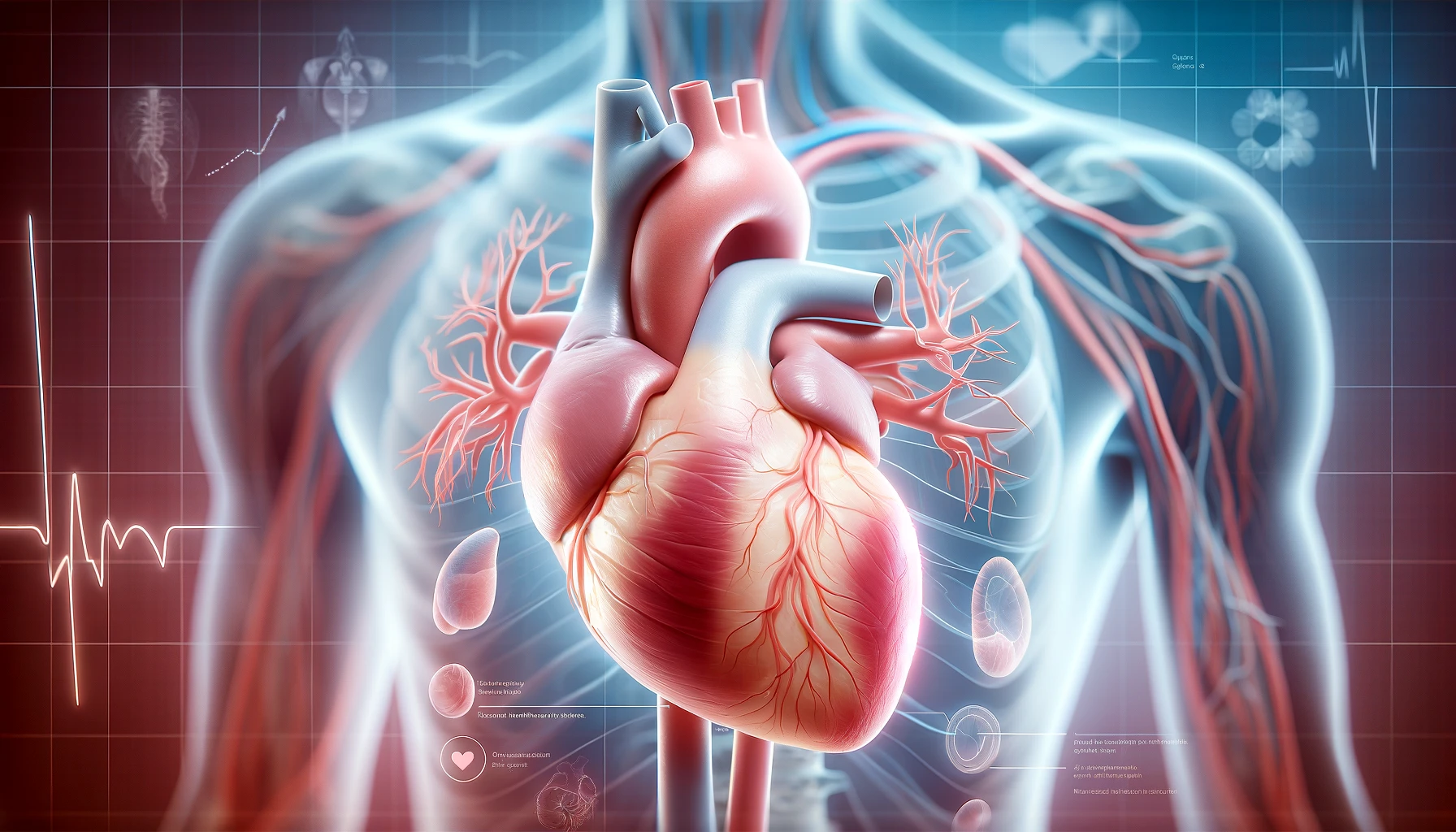There are many causes of a weak heart. You may not even be aware of the symptoms. We will help you identify the signs of a weak heart and whether you should see a cardiologist.
A strong and healthy heart is essential for overall well-being, as it ensures that blood, oxygen, and nutrients are efficiently distributed throughout the body. When the heart begins to weaken, it can lead to a cascade of health issues that may significantly impact one’s quality of life.
Recognizing the early signs of a weak heart is crucial for seeking timely medical intervention and preventing more severe complications. A weak heart can manifest in various ways, often subtly at first. These early symptoms can be easily overlooked or attributed to less serious conditions. However, understanding these initial indicators can make a significant difference in managing heart health and preventing the progression of cardiovascular diseases.
By being vigilant and proactive, individuals can take the necessary steps to maintain their cardiac wellness and reduce the risk of severe heart conditions. Identifying the first signs of a weak heart is important not only for those with a family history of heart disease but also for anyone looking to maintain a heart-healthy lifestyle. Early detection and management can lead to better outcomes and a higher quality of life. For more information on determining if you are at risk of a weak heart, you can visit our heart health page.
3 Physical Symptoms of a Weak Heart
Shortness of Breath
One of the earliest and most noticeable signs of a weak heart is shortness of breath. This symptom can manifest in various ways, often becoming apparent during physical activities such as climbing stairs, walking briskly, or engaging in exercise. Individuals may find themselves struggling to catch their breath, even during activities that previously posed no challenge. This difficulty in breathing can be a result of the heart’s reduced ability to pump blood efficiently, leading to a buildup of fluid in the lungs, known as pulmonary congestion. In more advanced cases, shortness of breath can occur even at rest. This is a particularly concerning sign, as it indicates that the heart’s function has significantly deteriorated. Patients may experience breathlessness while lying down, which can be alleviated by propping themselves up with pillows. This condition, known as orthopnea, is a clear indicator that the heart is struggling to meet the body’s demands for oxygen and nutrients. Recognizing and addressing this symptom early can be crucial for effective heart disease prevention and management.
Fatigue and Weakness
Another common early sign of a weak heart is persistent fatigue and weakness. Unlike the usual tiredness that follows a long day or strenuous activity, this type of fatigue is more pervasive and does not improve with rest. Individuals may find themselves feeling unusually tired even after a full night’s sleep, and this lack of energy can significantly impact their daily activities and overall quality of life.
This persistent tiredness is often due to the heart’s reduced ability to pump blood effectively, leading to decreased oxygen and nutrient delivery to the body’s tissues. As a result, muscles and organs do not receive the necessary resources to function optimally, leading to a constant state of exhaustion. This symptom can be particularly challenging to identify, as it may be attributed to other factors such as stress, poor diet, or lack of exercise.
However, when combined with other signs of a weak heart, it becomes a critical indicator that should not be ignored.
Chest Discomfort
Chest discomfort is perhaps the most well-known symptom associated with heart problems, and it can be an early sign of a weak heart. This discomfort can manifest as pain, pressure, tightness, or a squeezing sensation in the chest area. It may occur during physical activity, emotional stress, or even at rest. The pain can vary in intensity and duration, sometimes lasting only a few minutes or persisting for longer periods.
In some cases, chest discomfort may radiate to other parts of the body, such as the arms, neck, jaw, or back. This radiating pain is often a sign of angina, which occurs when the heart muscle does not receive enough oxygen-rich blood. Angina can be a precursor to more serious conditions such as a heart attack, making it essential to seek medical attention if this symptom occurs. Recognizing chest discomfort as an early sign of a weak heart is crucial for timely intervention and treatment. It is important to note that not all chest pain is related to heart problems, but any unexplained or persistent discomfort should be evaluated by a healthcare professional to rule out serious conditions and ensure proper cardiac care.
By understanding and identifying these physical symptoms, individuals can take proactive steps to maintain their cardiovascular wellness and seek appropriate medical care. Early detection and management of a weak heart can lead to significant improvements in heart function and overall health, reducing the risk of severe complications and enhancing quality of life.
3 Circulatory Symptoms of a Weak Heart
Swelling in Extremities
Swelling in the extremities, particularly in the ankles, feet, and legs, is a common circulatory symptom of a weak heart. This condition, known as edema, occurs when the heart’s diminished pumping efficiency leads to fluid retention in the lower parts of the body. The swelling can be mild, causing slight puffiness, or more severe, resulting in noticeable enlargement and discomfort. Edema is often more pronounced at the end of the day or after prolonged periods of standing or sitting.
In addition to the lower extremities, fluid accumulation can also occur in the abdomen, a condition known as ascites. This can lead to a feeling of fullness, bloating, and discomfort. The presence of edema and ascites indicates that the heart is struggling to maintain adequate circulation, causing blood to back up in the veins and fluid to leak into surrounding tissues. Recognizing these signs early is crucial for effective blood pressure management and overall cardiovascular wellness. Addressing swelling in the extremities involves a combination of lifestyle changes and medical interventions.
Reducing salt intake, elevating the legs, and wearing compression stockings can help manage mild edema. In more severe cases, medications such as diuretics may be prescribed to help the body eliminate excess fluid. Monitoring and managing these symptoms are essential components of a heart-healthy lifestyle and can significantly improve quality of life.
Irregular Heartbeats
Irregular heartbeats, or arrhythmias, are another key circulatory symptom of a weak heart. These can manifest as palpitations, where the heart feels like it is racing, fluttering, or pounding. Some individuals may also experience skipped beats or abnormal rhythms, which can be unsettling and cause significant anxiety. Arrhythmias occur when the electrical impulses that coordinate heartbeats are disrupted, leading to an irregular or abnormal heart rate. Palpitations and irregular heartbeats can be caused by various factors, including stress, caffeine, alcohol, and certain medications. However, when these symptoms are persistent or severe, they may indicate underlying heart problems that require medical attention.
Conditions such as atrial fibrillation, ventricular tachycardia, and bradycardia are examples of arrhythmias that can result from a weakened heart. Managing irregular heartbeats involves a comprehensive approach that includes lifestyle modifications, medication, and sometimes medical procedures. Reducing stress, avoiding stimulants, and engaging in regular cardiac fitness exercises can help maintain a stable heart rate.
In more serious cases, medications such as beta-blockers or antiarrhythmic drugs may be prescribed. For some individuals, procedures like cardioversion, ablation, or the implantation of a pacemaker may be necessary to restore normal heart rhythm and improve heart function.
Dizziness and Fainting
Dizziness and fainting are alarming circulatory symptoms that can be indicative of a weak heart. Feeling lightheaded or dizzy can occur when the heart is unable to pump sufficient blood to the brain, leading to a temporary reduction in oxygen supply. This can result in a sensation of spinning, unsteadiness, or a feeling of impending fainting. In more severe cases, individuals may experience actual fainting or near-fainting spells, known as syncope.
These symptoms can be triggered by various factors, including sudden changes in position, dehydration, or prolonged standing. However, when dizziness and fainting are recurrent or unexplained, they may signal serious heart conditions such as heart failure, arrhythmias, or structural heart defects. It is essential to seek medical evaluation to determine the underlying cause and implement appropriate treatment. Managing dizziness and fainting involves addressing the root cause and implementing preventive measures. Staying hydrated, avoiding sudden movements, and wearing compression stockings can help reduce the risk of these episodes. In cases where heart conditions are identified, treatments may include medications, lifestyle changes, and medical procedures to improve heart function and circulation.
Regular heart rate monitoring and follow-up with a healthcare provider are crucial for managing these symptoms and ensuring overall cardiovascular wellness. By understanding and addressing these circulatory symptoms, individuals can take proactive steps to maintain their coronary artery health and seek timely medical intervention. Early detection and management of a weak heart can lead to significant improvements in heart function and overall health, reducing the risk of severe complications and enhancing quality of life.
3 Changes in Health Metrics Indicating a Weakening Heart
Elevated Blood Pressure
Elevated blood pressure is a significant health metric that can indicate a weak heart. Consistently high blood pressure readings, also known as hypertension, place additional strain on the heart and blood vessels. Over time, this increased pressure can lead to the thickening of the heart muscle, reducing its efficiency and ability to pump blood effectively. This condition is often asymptomatic in its early stages, making regular blood pressure monitoring crucial for early detection and management.
Hypertension is closely linked to various heart disease risk factors, including poor diet, lack of exercise, obesity, and stress. It is also a major contributor to the development of coronary artery disease, heart failure, and other cardiovascular conditions. Managing elevated blood pressure involves a combination of lifestyle changes and medical interventions.
Adopting a healthy heart diet, engaging in regular cardiac fitness exercises, and reducing sodium intake are essential steps in maintaining optimal blood pressure levels. In addition to lifestyle modifications, medications such as ACE inhibitors, beta-blockers, and diuretics may be prescribed to help control blood pressure. Regular check-ups with a healthcare provider are essential for monitoring blood pressure and making necessary adjustments to the treatment plan.
By addressing elevated blood pressure early, individuals can significantly improve their heart function and reduce the risk of severe cardiovascular complications.
Weight Gain
Rapid, unexplained weight gain is another important health metric that can signal a weak heart. This type of weight gain is often due to fluid retention rather than an increase in body fat. When the heart’s pumping efficiency declines, it can lead to the accumulation of fluid in the tissues, particularly in the lower extremities and abdomen. This condition, known as edema, can result in noticeable weight increases over a short period. Fluid retention and weight gain are common symptoms of heart failure and other cardiovascular conditions.
It is essential to differentiate between weight gain due to fluid retention and that caused by dietary or lifestyle factors. Monitoring weight regularly and noting any sudden changes can help identify potential heart health issues early. Addressing fluid retention involves a combination of lifestyle changes, such as reducing salt intake and elevating the legs, and medical interventions, including the use of diuretics to help the body eliminate excess fluid. Maintaining a healthy weight is crucial for overall cardiovascular wellness.
Adopting a heart-healthy lifestyle that includes a balanced diet, regular exercise, and stress management can help prevent weight gain and improve heart function. For individuals with existing heart conditions, working closely with a healthcare provider to manage weight and fluid retention is essential for optimizing heart health and preventing complications.
Decreased Exercise Tolerance
Decreased exercise tolerance is a key health metric that can indicate a weak heart. Individuals may find it increasingly difficult to perform physical activities that were once routine, such as walking, climbing stairs, or engaging in exercise. This reduced stamina and endurance can be a result of the heart’s diminished ability to pump blood efficiently, leading to decreased oxygen and nutrient delivery to the muscles and tissues. Difficulty performing usual physical activities can significantly impact quality of life and overall well-being. It is essential to recognize this symptom early and seek medical evaluation to determine the underlying cause. In many cases, decreased exercise tolerance is associated with heart failure, coronary artery disease, or other cardiovascular conditions. Addressing this symptom involves a comprehensive approach that includes lifestyle modifications, medical interventions, and participation in cardiac rehabilitation programs.
Engaging in regular cardiac fitness exercises tailored to individual capabilities can help improve exercise tolerance and overall heart function. These exercises should be performed under the guidance of a healthcare provider or a cardiac rehabilitation specialist to ensure safety and effectiveness. Additionally, adopting a healthy heart diet, managing blood pressure, and controlling cholesterol levels are essential components of a heart-healthy lifestyle that can enhance exercise tolerance and improve cardiovascular health.
By monitoring and addressing changes in health metrics such as elevated blood pressure, weight gain, and decreased exercise tolerance, individuals can take proactive steps to maintain their heart health and seek timely medical intervention. Early detection and management of a weak heart can lead to significant improvements in heart function and overall health, reducing the risk of severe complications and enhancing quality of life.
Recognizing the Early Signs of a Weak Heart
Recognizing and addressing the early signs of a weak heart is paramount for maintaining cardiovascular wellness and preventing severe health complications. The physical symptoms such as shortness of breath, fatigue, and chest discomfort, along with circulatory symptoms like swelling in the extremities, irregular heartbeats, and dizziness, serve as critical indicators that should not be ignored.
Additionally, changes in health metrics, including elevated blood pressure, rapid weight gain, and decreased exercise tolerance, provide valuable insights into the heart’s condition. Early detection of these signs allows for timely medical intervention, which can significantly improve heart function and overall health outcomes. Understanding these early warning signs empowers individuals to take proactive steps in managing their heart health. By being vigilant and informed, one can seek appropriate medical advice and implement necessary lifestyle changes to mitigate the risk of developing more serious cardiovascular conditions.
Regular check-ups, heart rate monitoring, and adherence to prescribed treatments are essential components of effective heart disease prevention and management. Recognizing the importance of these early signs can lead to better health outcomes and a higher quality of life. Encouraging individuals to seek medical advice and adopt heart-healthy habits is crucial for long-term cardiovascular health. Consulting with healthcare professionals at the first sign of heart-related symptoms ensures that any underlying conditions are promptly diagnosed and treated.
Our medical experts here at Prime can provide personalized cardiac care tips, recommend suitable cardiac rehabilitation programs, and prescribe medications or interventions as needed. Moreover, adopting a heart-healthy lifestyle, which includes a balanced diet, regular exercise, and stress management, plays a vital role in maintaining optimal heart health. Incorporating heart health supplements, managing cholesterol levels, and adhering to a healthy heart diet are additional measures that can support cardiovascular wellness. Engaging in regular cardiac fitness exercises and monitoring blood pressure are practical steps that contribute to overall heart function improvement.
By fostering a proactive approach to heart health, individuals can significantly reduce the risk of heart disease and enhance their overall well-being. Taking these steps not only improves physical health but also promotes a sense of empowerment and control over one’s health journey.





